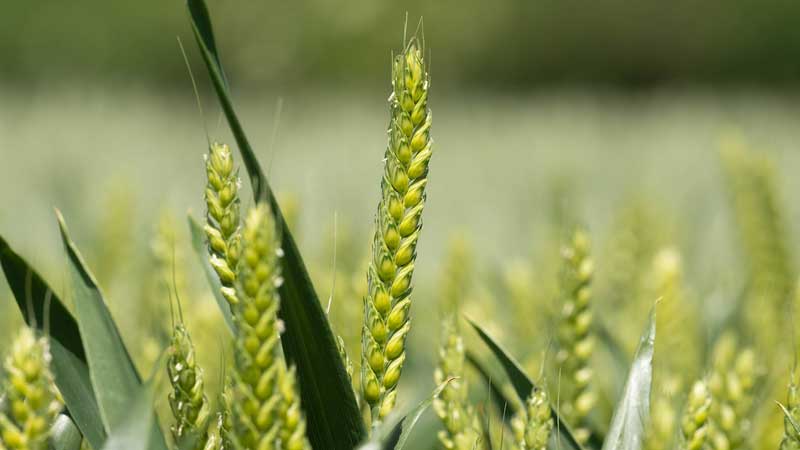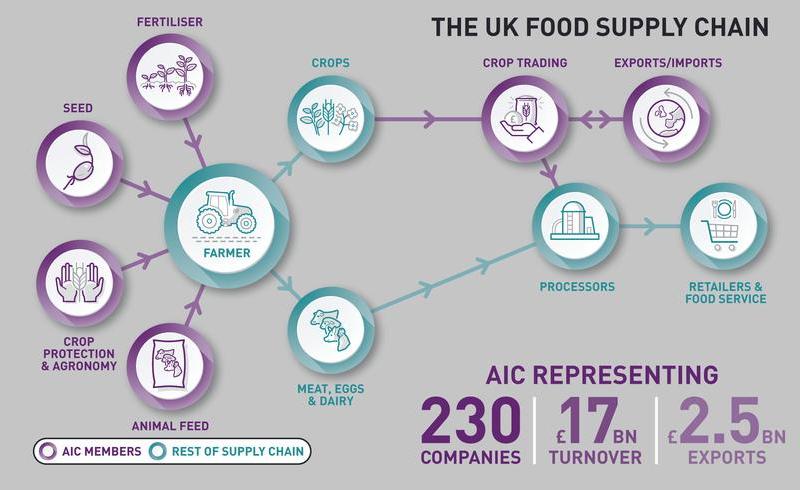Boost for domestic crop production as precision breeding technology becomes law

The benefits of gene editing have been approved for use in England as the Genetic Technology (Precision Breeding) Act became law today (23 March), paving the way for a boost to crop production.
The UK's agri-supply trade association the Agricultural Industries Confederation (AIC) says the legislation has the potential to bring significant benefits to the environment, producers, the agri-food supply chain and consumers.
Crops bred using genetic technology can be made to better withstand the effects of climate change, such as flooding or drought, as well as having a greater resistance to pests and disease.
Gene editing could help with producing more home-grown protein for animal feed, thereby cutting the UK's dependence on imports. It may also food for those with special dietary needs, such as Coeliac-safe wheat.
Significant moment
AIC's Chief Executive Robert Sheasby said: "This is a significant moment for UK food production. With growing challenges facing agriculture and the environment, AIC is clear that more efficient plant breeding technologies could play an important future role in feeding the nation.
"While precision breeding is by no means the sole answer to the challenges of climate change and straining food systems, the potential that could be achieved in a variety of agricultural sectors cannot be overlooked.
"Precision breeding is an opportunity afforded by the UK's EU exit to unlock agri-food innovation, and AIC has worked closely with the Government as this legislation was developed to ensure it is workable in practice."
Plants developed with gene editing techniques involve genetic changes which would have occurred naturally or through traditional breeding methods, but typically take many years to achieve.
This differs from genetic modification (GM), which produces organisms containing additional genes.
Benefits and challenges
Last summer Ed Barker, AIC's Head of Policy and External Affairs, was invited to present evidence to a committee of MPs tasked with scrutinising the legislation.
Ed provided insight on how its provisions had the potential to benefit agriculture, while outlining the challenges to be resolved.
One challenge that remains is regulatory divergence. This legislation applies to England only, as Scottish and Welsh devolved governments do not currently support it.
However, food produced using precision breeding techniques in England can be legally marketed in Scotland and Wales under the UK Internal Market Act.
The European Union is currently debating its own legislation on precision breeding, making the UK a world-leader in legislating for the use of this technology.
Future food production
The Department of Environment, Food and Rural Affairs (Defra) Minister Mark Spencer said: “The Genetic Technology Act is fantastic news for British consumers and farmers.
"Precision Breeding technologies are the future of food production not just at home, but around the world, and this Act will put our nation at the forefront of this revolution.”
Gideon Henderson, Defra's Chief Scientific Adviser, commented: “This is an important time for agricultural science.
"The ability to use gene editing to make precise, targeted changes to the genetic code of organisms, in a way that can mimic traditional breeding, enables the development of new crop varieties that are more resistant to pests, healthier to eat, and more resilient to drought and heat as climate changes.”
ENDS
About AIC
As the UK agricultural supply industry's leading trade association, the Agricultural Industries Confederation (AIC) represents businesses in key sectors within the supply chains that feed the nation.
Its Member businesses supply UK farmers and growers with the animal feed, fertiliser, seed, crop protection products, trusted advice and quality services that are essential to producing food, as well as trading crops and commodities across the globe.
Formed in October 2003 by a merger of three trade associations, today AIC has over 230 Members in the agri-supply trade and represents £17.8 billion* turnover at farmgate.
AIC works on behalf of its Members by lobbying policymakers and stakeholders, delivering information, providing trade assurance schemes, and offering technical support.

AIC Services manages a range of services, including Trade Assurance Schemes and professional registers recognised by the UK Government as essential means to underpin feed and food safety alongside fertiliser security.
These schemes and professional registers include:
- Trade Assurance Scheme for Combinable Crops (TASCC)
- Feed Materials Assurance Scheme (FEMAS)
- Universal Feed Assurance Scheme (UFAS)
- European Seed Treatment Assurance (ESTA)
- Fertiliser Industry Assurance Scheme (FIAS)
- Feed Adviser Register (FAR)
- Renewable Energy Directive (RED)
- Forage Assurance Scheme (FAA)
- AIC Services Palm Oil Credit Scheme (APOCS)
*According to a 2023 survey of AIC Members.
Press Contact
Wendy Ford, Communications Manager, AIC
+44 (0)1733 385230
[email protected]



